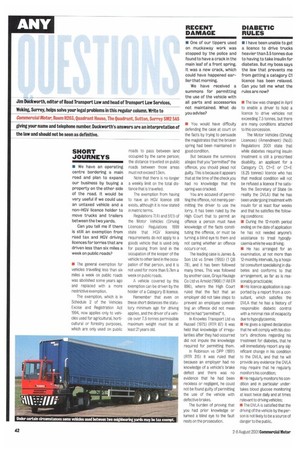RECENT DAMAGE
Page 42

If you've noticed an error in this article please click here to report it so we can fix it.
• One of our tippers used on muckaway work was stopped by the police and found to have a crack in the main leaf of a front spring. It was a new crack, which could have happened earlier that morning.
We have received a summons for permitting the use of the vehicle with all parts and accessories not maintained. What do you advise?
• You would have difficulty defending the case at court on the facts by trying to persuade the magistrates that the broken spring had been maintained in good condition.
But because the summons alleges that you "permitted" the offence, you should plead not guilty. This is because it appears that at the time of the check you had no knowledge that the spring was cracked.
You are accused of permitting the offence, not merely permitting the driver to use the lorry. It has been ruled by the High Court that to permit an offence a person must have knowledge of the facts constituting the offence, or must be turning a blind eye to them and not caring whether an offence occurs or not.
The leading case is James & Son Ltd vs Smee (1955) (1 QB 78), and it has been followed many times. This was followed by another case, Grays Haulage Co Ltd vs Arnold (1966) (1 All ER 896), where the High Court ruled that the fact that an employer did not take steps to prevent an employee committing an offence did not mean that he had "permitted" it.
In Knowles Transport Ltd vs Russell (1975) (RTR 87) it was held that knowledge of irregularities after they had occurred did not impute the knowledge required for permitting them.
In Robinson vs DPP (1991) (RTR 315) it was ruled that because an employer had no knowledge of a vehicle's brake defect and there was no evidence that he had been reckless or negligent, he could not be found guilty of permitting the use of the vehicle with defective brakes.
The burden of proving that you had prior knowledge or turned a blind eye to the fault rests on the prosecution.




















































































































